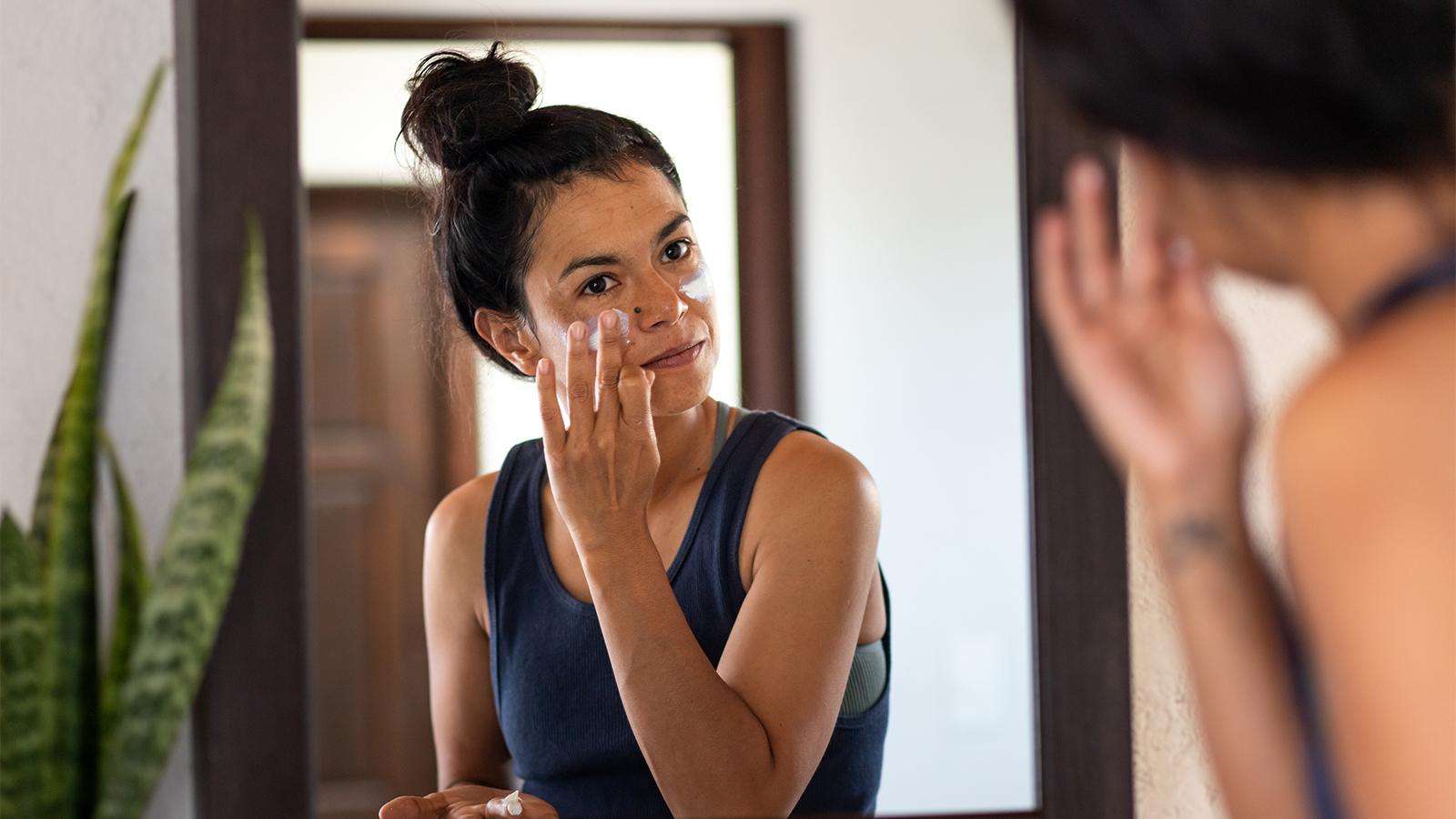4 Not-So-Crazy Questions to Ask Your Doctor
Exuberan by Virtua lead physician Nermin Lazarus, DO, answers some of the typical “not-so-crazy” questions she gets from women about sex, anxiety, skin health, and more

By Nermin Lazarus, DO, Family Medicine and Lead Physician, Exuberan by Virtua
What’s the craziest question a patient asked you?
Please know—there are NO crazy questions. I'm not going to make any judgments about you based on your questions. If you don't ask them, they'll only cause you stress and could hurt your health.
Here are some of the "not-so-crazy" questions women ask me every day (even if it takes lots of prompting).
Is it common for sex to be painful?
No. Sex should be pleasurable—not painful.
Painful sex often results from vaginal dryness, which is very common in women over age 40 who are going through perimenopause. It's also common in younger women who recently had a baby.
It may feel awkward, but it's important to share your concerns with your PCP because many treatments can help, including lubricants, hormone creams, hormone replacement therapy, and bioidentical hormone treatments. There are a range of issues that can lead to painful sex, including pelvic floor disorders and sexual dysfunction, but there are also experts who want to help you get back to feeling your best.
Why do I feel anxious and stressed all the time?
This is so common among women today, but it's also something they’re afraid to bring up. Work, kids, chores, driving, unexpected life events—all these things can increase agitation and make you feel like you're falling apart.
Sometimes, you need to hear that you're not alone in feeling that way. We try to put on a perfect Instagram-worthy façade, but we're all far from perfect—and that's OK. To help you de-stress, I recommend deep breathing, meditation, yoga, walking, or doing something you enjoy. I also recommend getting 7 to 8 hours of sleep per night and eating nutritious meals, as fatigue and a steady diet of junk food can deplete your energy and tolerance for stress.
When necessary, I prescribe counseling or appropriate medications that work together with lifestyle modifications to relieve your anxiety and agitation and help you regain control of your feelings and your life.
Is this spot on my arm something to worry about?
Women feel like this is a question better suited to a dermatologist, but I see and treat minor skin issues all the time. I carefully evaluate skin issues and refer patients to a dermatologist for suspicious spots and more serious skin problems—especially on the face.
The skin issues women experience most include:
- Spots that appear to be scabs but don't heal
- Moles that seem harmless but have changed shape or gotten larger
When it comes to your skin, it's always better to be safe than sorry. It's NOT ridiculous to ask about even the tiniest spot. It could end up saving your life.
Am I seeing things, or is it possible I'm losing my hair?
If you notice that your part is getting wider or your hair feels unusually thin, you're probably not seeing things. You could be losing hair.
While seeing hair on your pillow or brush can be expected, excessive amounts can indicate a problem. It doesn't necessarily mean permanent hair loss. It could be a temporary problem caused by stress, medications, metabolic issues like hypothyroidism, or poor eating habits.
We'll help you evaluate the stressors in your life that may be contributing to hair loss and run tests to diagnose thyroid problems or vitamin deficiencies. Treatment depends on the cause, but most of these issues have solutions that will help you regain your healthy head of hair.
Is it time for a check-up with your PCP?
Schedule a primary care appointment online or call a Virtua women's health navigator at 844-896-6367.
There's So Much More to Explore
Discover expert insights, inspiring stories, health tips, and more by exploring the content below!

Knee Replacement Rehab: 7 Exercises to Restore Your Strength and Range of Motion

Caregiving During the Holidays: Ways to Manage Stress and Find Joy

Bioidentical Hormone Replacement Therapy Pellets: Relief for Menopause and Andropause Symptoms

Why Is Sex Painful During Pregnancy? Pelvic Congestion Syndrome Explained

COVID-19 Vaccines and Pregnancy: FAQs

COMFORTing Tips to Avoid Holiday Heartburn

How to Tell the Difference Between Cold, Flu, and COVID-19

4 Exercise Tips to Help You Reverse High Blood Pressure

From Exhaustion to Empowerment: Tracy's Hormone Replacement Therapy Success Story

Daily Wellness Checklist: Simple Habits for Feeling Good Inside and Out

Sexual Health FAQs: The Questions Everyone’s Too Embarrassed to Ask

3 Reasons Why Now's the Time to Find Relief From Varicose Veins

The Brain Health Checklist: 11 Questions Everyone Should Ask

How to Get and Stay Healthy This Fall

How to Reverse Prediabetes and Prevent Type 2 Diabetes

6 Ways to Get More Out of Your Daily Walk

Young Breast-Cancer Survivor Has New Hope for Healthy Future

HeartTalk Magazine

What To Know About Vaginal Discharge During Pregnancy

Is Cancer Hereditary? What You Need to Know About Your Genetic Risks

Tara's Story: From Debilitating Uterine Fibroid Pain to a Half-Marathon Medal

Is Your Post-Pregnancy Belly Bulge a Sign of Diastasis Recti?

Your Guide to Mammograms: When to Get Screened and What to Know

The Top 10 Foods That Boost Your Brain Health

Is It Safe to Exercise During Pregnancy?

Prevent Yard Work Injuries: Tips for Mowing, Gardening, and Raking

Where To Seek Mental Health Help And Treatment

Healthy Weight Gain During Pregnancy: A Guide for Moms-to-Be

How to Curb Nighttime Snack Cravings

Is Your Daily Walk Making You Really Sore?

IBS and Alcohol: Can You Still Enjoy a Drink?

'Feeling Joy Again': ECT Brain Stimulation Therapy Restores Ashley's Well-Being

Not Just for Wrinkles: Botox Injections Promote Improved Bladder Control

Caring Maternity Team Transforms Harley's Pregnancy Crisis Into Lasting Memories

Robotic Hysterectomy, Trusted Care Help Bobbi Shine Again

Easy, Healthy Lunch Ideas for the Beach

How to Stay Cool and Prevent Heat Illness All Summer Long

Do Not Get Burned by These Sunscreen Myths

Beat the Bugs and Save Your Summer

How to Have a Healthy Pregnancy if You're Overweight

Why You Get Sick on Vacation (and How to Stay Healthy While Traveling)

6 Hot Tips for a Safer Summer

4 Surprising Health Truths You Should Know

5 Interesting Facts About Your Heart

Is Low Sex Drive Normal? Revealing the Complex Causes of Low Libido in Women

CABG Surgery: What Women Should Know About Heart Health and Healing

5 Feel-Good Activities to Explore Around South Jersey

Stress Incontinence vs. Urge Incontinence: What's the Difference?

3 Changes You Can Make Today to Lower Your Cancer Risk

A Lung Cancer Screening Could Save Your Life

Mood Swings vs. Mood Disorders: Know the Signs and Get Help
Are emotional ups and downs disrupting daily life? Learn common signs of mood disorders, and when to talk to a doctor about diagnosis and treatment options.

Take Pride in our Health: Must Dos for LGBTQ+ Preventative Care

4 Foolproof Pelvic Floor Strengthening Exercises for Women

What to Expect During Perimenopause

Protect Yourself From Tick Bites and Lyme Disease

10 Quick Ways to De-Stress

4 Ways to Stay Fit and Healthy on a Budget

Do You Know the Signs and Symptoms of Uterine Fibroids?

How Are Uterine Fibroids Treated?

Can I Have Sex After a Hysterectomy?

From Restless to Restful: How Movement Improves Sleep

5 Simple Ways to Spring Clean Your Wellness Routine

What to Expect From a Robotic Hysterectomy

When You Need A Hysterectomy Know Your Options

Take Control of Incontinence, Prolapse, and Other Pelvic Floor Disorders

How Can I Prevent Bone Loss and Osteoporosis?

The Truth About Menopause, Weight Gain, and Belly Fat

Shedding Light on Lesser-Known Menopause Symptoms and Solutions

Debunking The Myths About Vaginal Dryness

Best Foods for Kidney Health

What Causes Food Addiction And What Are The Signs

5 Essential Winter Foot Care Tips When You Have Diabetes

Sweet Music: Trust, Teamwork Save Justin from Heart Attack

Advanced Minimally Invasive GYN Surgery Puts You at the Center of Care

Your 10-Point Plan to Avoid Winter Weight Gain

Colitis Symptoms Under Control, Jennifer Is ‘Living My Best Life’

Be Fast and Spot the Signs of Stroke

Surprising Symptoms May Signal Stroke In Women

8 Key Steps to Better Blood Pressure Control

5 Back Stretches for the Work-From-Home Workweek

The HPV Vaccine: A Powerful Shield Against Cervical Cancer

How Does Breast Density Affect Your Mammogram?

Menopause: New Insights Into the Power of Hormone Replacement Therapy

How to Prevent and Treat Urinary Tract Infections

One New Heart Valve Saves Two Lives in the Tritten Family

6 Numbers Key to Keeping Your Heart Healthy

4 Easy Ways to Treat and Prevent Runner's Knee

Breast Cancer Diagnosis Inspires Catherine to Help Others

Five Mindfulness Tips That Can Help Heal Your Heart
Working from Home? Take a Quick Break to Stretch Your Wrists

Love Your Heart: Essential Care Tips for Every Stage of Life

How Do I Measure My Blood Pressure at Home?

How Do I Improve My Cholesterol Levels?

3 Ways to Reduce Your Stroke Risk

How the Unique Stages of a Womans Heart Affect Her Health

Sarah Wins Back Her Health After Crohn's Disease Diagnosis

A Breast Self-Exam Saved Kristen's Life

How Sex Keeps You Healthy as You Age

Protect Your Child From HPV and Related Cancers

Why IUDs Might Be The Most Effective Birth Control

5 Things You're Too Embarrassed to Tell Your OBGYN

4 Not-So-Crazy Questions to Ask Your Doctor

What to Know About Cervical Cancer Screenings

